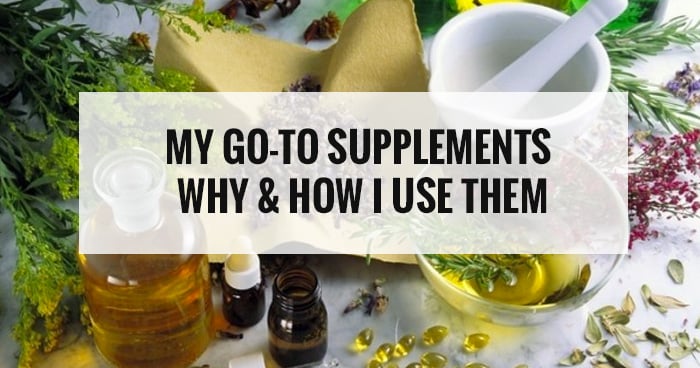
This week I am giving you a glimpse into some of my healthy living habits. These are things my reader often ask me about: how I stay fit, natural skin care, and essential oils I use. In today’s post, I’m covering some of the supplements I take often or occasionally, to give you an idea of why they work for me, and why I believe in their benefits.
Navigating vitamins, supplements, and superfoods can be tough to do. There’s a lot of information out there, and moreover, there’s a lot of debate over whether or not these supplements actually work. My philosophy? Less is more, plus I try to get my nutrients from real food as much as possible. It’s all about quality over quantity and tailoring your supplements to your specific needs. Here’s a look into my go-to supplements, when I take them and how.
It goes without saying that supplementation requires a personal approach and you should always consult a doctor or a nutritionist.
Magnesium
Considering magnesium is a macromineral, it’s one we need to pay attention to. Macrominerals are essentially a mineral we need 100 milligrams or more of per day. Magnesium deficiency is relatively common, and it’s especially prevalent in older populations.
Benefits of magnesium:
- Aids in the proper functioning of hundreds of enzymes.
- Contributes to good bone health.
- Can decrease risk of diabetes up to 15 percent.
- Keeps the heart healthy.
- Can reduce PMS symptoms.
- It’s also really good for relaxation and as a natural sleep aid, which is why you might feel so calm after a magnesium (or Epsom salt) bath.
The best way to get it is through food, which is true of most vitamins and mineral, but you can also take a supplement for it. It’s absorbed in the small intestine, so bioavailability – or how much we absorb – depends on GI health and the diet as a whole. Foods high in magnesium include sunflower seeds, almonds, avocado, dark chocolate, spinach, and bananas. If I feel I need a top up of magnesium, I use magnesium oil spray and Epsom salts in my bath before bed. I probably do this twice per week, on average.
Vitamin D
Vitamin D is the good ol’ sunshine drug. It’s best absorbed via daily sun exposure, but if you live in London like me, you know that it’s never a sure bet. That’s why I like to supplement with it, and make sure I can get plenty of the good stuff into my diet. This is one of the most common deficiencies and it’s tough to keep at bay.
Benefits of Vitamin D:
- Decreases risk of osteoporosis.
- Reduces risk of cancer – specifically colon, prostate, and breast cancer.
- Has potential to lower risk of diabetes.
- It’s also linked to increased mood which you’ve probably noticed during summer months when you get plenty of sun exposure.
The toughest part about getting enough vitamin D – and another reason we’re so deficient – is because it’s not found in very many foods. The foods it is found in aren’t always a big part of the mainstream diet, namely, sardines and liver. You might be squeamish, but these super foods are “super” for a reason. Other fatty fish, pastured eggs, cheese (if you can tolerate it), butter, and mushrooms are also good sources. The key is to eat these foods regularly enough to keep levels up.
The body produces vitamin D from sunlight, so it essentially reaches for stores which is something to keep in mind with supplements. There are two forms available, but I recommend D3 because at high doses, it’s more potent. I take Thorne Research Vitamin D tablets throughout winter months, mostly on days when the sun goes into hiding. Thorne Research is my preferred brand for supplements and vitamins, by the way.
Kelp
Kelp is a lovely addition to any diet, and I’m always looking for ways to use it. Sea veggies are notoriously nutrient-dense, so if you’re looking to try new greens, take note! The main reason for kelp’s high regard in the health world is its iodine content – another rather common, but often non-invasive, deficiency.
Benefits of iodine:
- This nutrient is lacking in most other foods besides iodized salt, and kelp is one of the only solid food sources.
- Proper levels of iodine are associated with a health thyroid which is why seaweed may be associated with weight loss.
- Balance of the hormones produced by the thyroid can also lead to increased energy and lower cholesterol.
- Consumption can decrease ill-effects of radiation – great for after plane travel or x-rays!
- Alginate, something found in seaweed, can help protect the gut wall while increasing good bacteria in the gut.
Kelp might turn you off, but it actually has a nice, mellow, umami flavour, and kelp noodles are a good grain-free pasta substitute. They’ll take on any flavour you spin them with, and they’re especially good in Asian dishes. You can also take kelp powder if you’re not keen on the taste.
I personally add kelp supplement to my diet to balance my hormones and to protect my thyroid (thyroid cancer in the family + growing up in Ukraine during the Chernobyl accident!), so I take 2-3 kelps tablets per week with my breakfast unless I get it through food: seafood and seaweed.
Zinc
Zinc really comes in the clutch when my immune system is feeling weak. Stress, travel, dreary weather, and exposure to germs happen, so zinc helps me feel prepared. Getting sufficient zinc regularly keeps the immune system strong and more resilient to keep from getting a cold in the first place. For me, I take it if I’m feeling run down or getting a cold sore, which for me is a sign of weak immune system or stress. If I get cold or catch a virus, this is the first supplement I reach for.
Benefits of zinc:
- It increases immunity and helps ward off colds, or fight a cold if you have one due to its ability to produce an antiviral effect.
- Its anti-inflammatory properties and antioxidant content make it good for reducing cancer risk as it promotes good cellular function.
- Its antioxidant content helps reduce oxidative stress.
- Considering its important role in hormone production, it’s good for hormone balance and fertility.
- Having enough zinc aids in our body’s ability to use amino acids, increasing nutrient absorption rates.
The list goes on and on! A fun test to do to see if you’re deficient in zinc is to run a taste test. Pick up a bottle of liquid zinc and take a drop – but don’t swallow! Keep it there until you notice a taste. If it’s immediately very pungent, you’re getting plenty of zinc. If it’s a mild come-on, but you start to notice a mineral-ish taste, you’re somewhere in the middle. If it tastes overly sweet, you are definitely deficient and should consider supplementation.
Overall, a supplement and animal foods will help you boost your levels. Plant foods containing zinc aren’t as available to the body as they are from animal foods like prawns, pastured cheese, and high-quality meat.
Vitamin C
Vitamin C – or ascorbic acid – is another great immune booster. We don’t see many cases of scurvy these days because most people are simply getting enough vitamin C. It’s not hard considering how many fruits and veggies it’s found in. A serving of leafy greens should do you good! It’s water-soluble, so you can’t get too much of the stuff, but you’re not going to absorb more than 200 milligrams.
Benefits of vitamin C:
- Vitamin C helps manage progesterone levels. This hormone ensures proper sleep and emotions. It’s actually the second most common imbalance in women, especially past age 30.
- It’s fabulous for the skin! Vitamin C can reduce brown spots, boost healthy collagen production, and improve the skin’s healing process. Moreover, vitamin C can actually increase the effectiveness of sunscreen!
- It lowers hypertension risk which in turn, reduces risk of heart disease and promotes good cardiovascular health.
- It can boost mood due to vitamin C’s role in the production of norepinephrine.
- It helps connective tissue repair, so it can aid in the process of wound healing.
- Increases iron absorption.
Food sources include all citrus fruits, of course, plus cruciferous veggies like cabbage, broccoli, and cauliflower, red peppers, kiwi, and leafy veggies. If you’re getting in plenty of fruits and vegetables, you should be good on the vitamin C front.
I like to supplement with it if I’m trying to boost my immune system or recover from a bug, and I swear by taking extra vitamin C during the flu season or winter months.
Vitamin K2
Real food pioneer, Dr. Weston A. Price, discovered vitamin K2 and called it ‘Activator X.’ He found that people who weren’t eating industralised food were taking in this unidentified nutrient that was warding off tooth decay. These populations also weren’t suffering from chronic disease. Later, we would find out this is vitamin K2.
Benefits of vitamin C:
- It’s an essential nutrient mainly for blood clotting.
- This study shows that vitamin K2 intake is associated with lower risk of heart disease because it reduces calcification of the arteries, due to its ability to modify proteins which help them bind to calcium.
- It can help keep bones strong and prevent osteoporosis by slowing the process of age-related bone mineral density.
- Considering Dr.Price’s discovery, in addition to a whole foods diet, vitamin K2 could potentially improve dental health.
Food sources include animal foods and fermented foods. Fermented foods can act as a great supplement whether you take a bit of kimchi on your eggs or drink a glass of kombucha each day. When using vitamin K2 as a supplement, keep in mind it is a fat-soluble vitamin, and it’s more available to the body when taken with fat. This shouldn’t be a problem if you’re chowing down on raw or grass-fed dairy, beef, liver, or the other foods it’s found in! I mostly get it through food but I like to supplement with 1-2 capsules per week.
Collagen
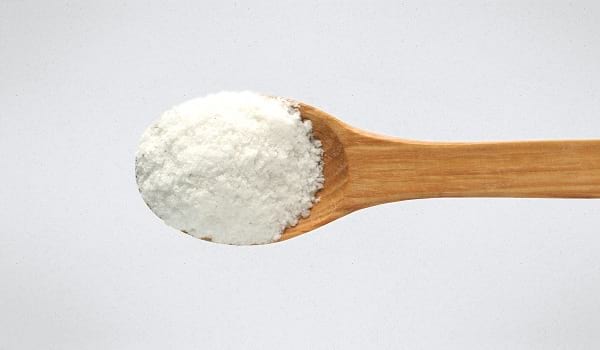
Collagen is a MUST. If I had to recommend one supplement to anyone, it would be this. With a full amino acid complex, this complete protein boasts big benefits for gut health, skin, hair, nails, and digestion. Sourced from grass-raised cows, collagen is a simple, tasteless addition to coffee or smoothies.
Benefits of collagen:
- Collagen can help anxiety. Glycine is a non-essential amino acid found in collagen, which is an inhibitory neurotransmitter. It slows down the production of norepinephrine which tends to induce feelings of anxiety
- Glycine can also improve the quality of your sleep because it can help reduce core body temperature.
- Glycine and proline protect collagen. Collagen is one of the most prominent pieces to the puzzle of our skin, so consuming gelatin which is rich in both aforementioned compounds can help keep it healthy.
- Collagen helps to produce stomach acid. This means that the stomach acid will move more quickly to the food that needs to be digested. You can expect to experience less gas, bloating, and discomfort after your meals.
- Since the bones are made up mostly of collagen, supplementing with collagen helps to build them up.
Need I say more? You could also use grass-fed gelatine which contains all of the same benefits, only it gels as the name suggests. This makes it easy to use as a topical supplement in DIY face masks or hair treatments, or you can make gummies with it for your daily dose. I simply mix a tablespoon of this collagen powder in water and drink it up.
I hope you enjoyed this post about my personal supplement routine. Let me know which ones you might suggest adding to the mix. Hopefully, I could help clear up some confusion on which supplements are ‘best,’ but the truth is, there is no one-size-fits-all method for figuring that one out!

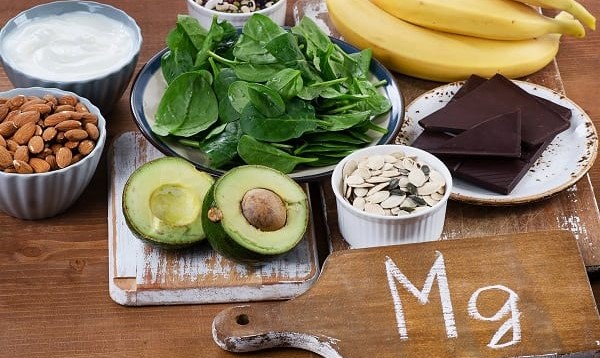
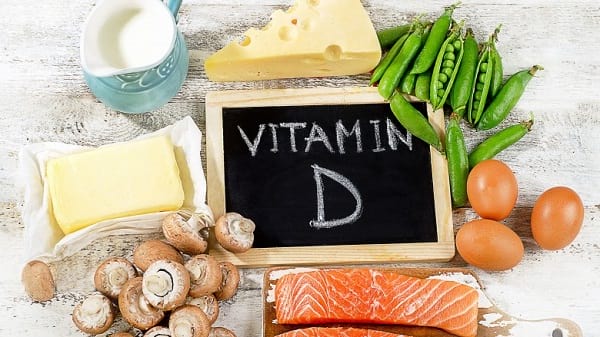
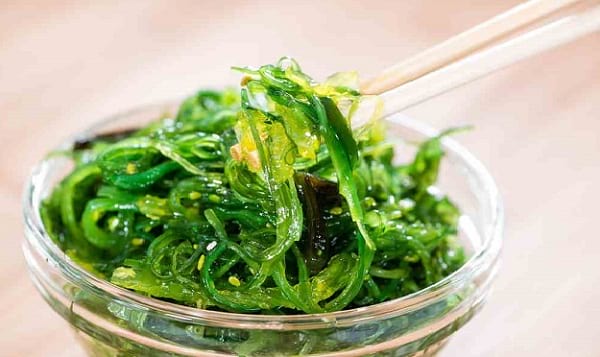
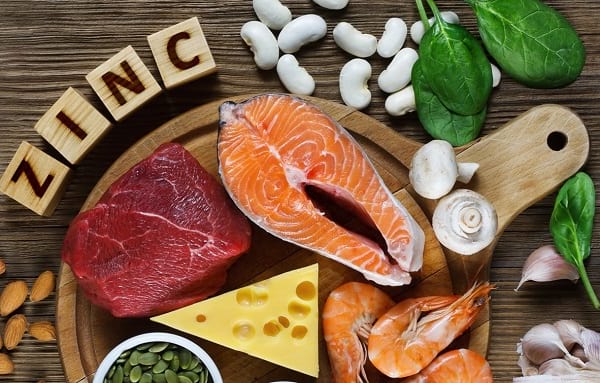
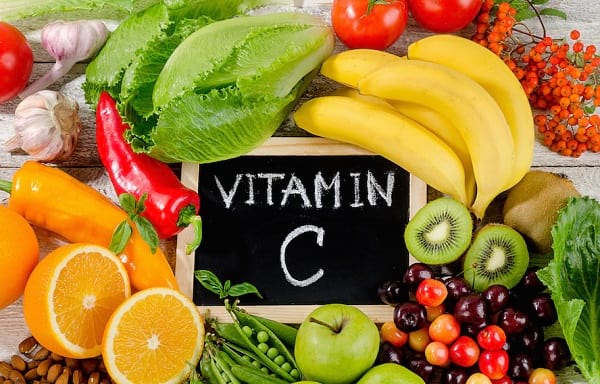
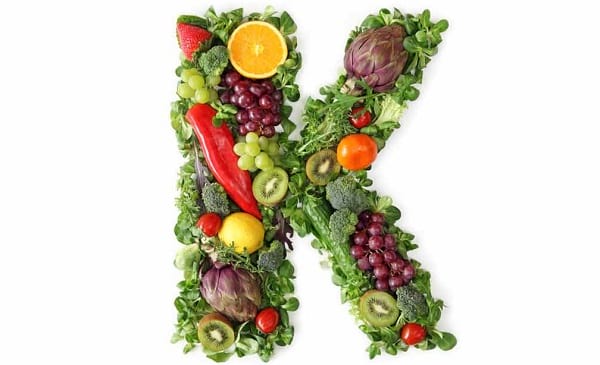
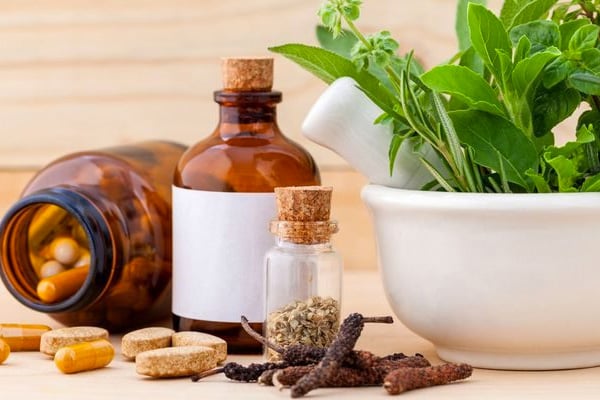

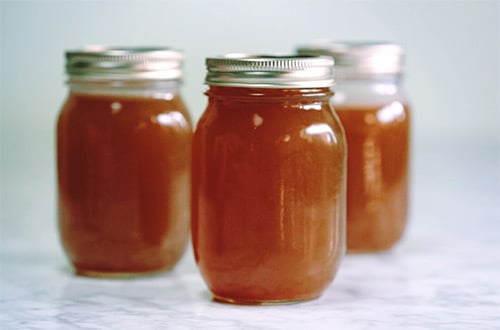
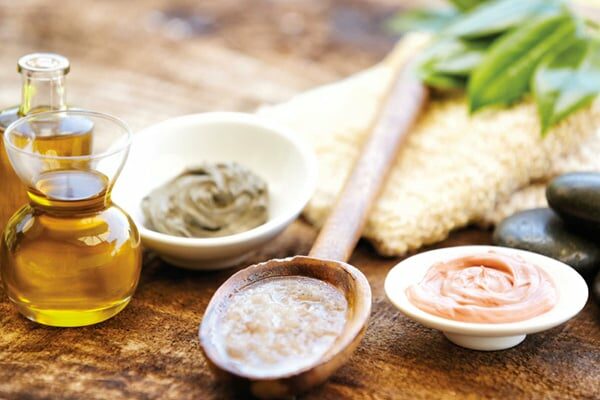
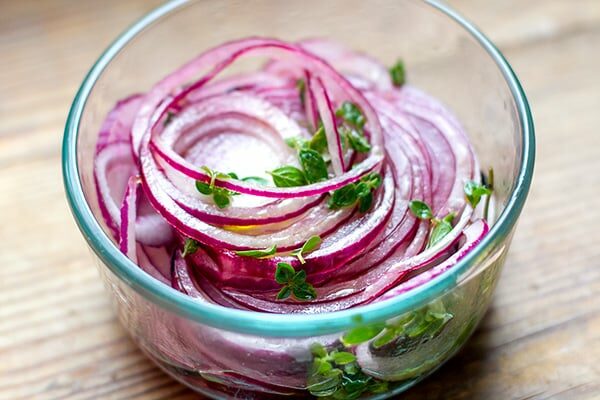

This was fantastic and timely and many of the things my practitioner prescribed yet I am flaky with doing do. I especially liked the zinc tip. Do you have a kelp tablet you prefer?
I use NOW brand of Kelp. It might not be the best but it gets the best reviews from personal research. Also depends on where you are, of course. I get mine on Amazon.
Which collagen supplement do you recommend?
There are quite a few on the market, so depends on where you are. Vital Proteins is quite good and you can get it on Amazon.